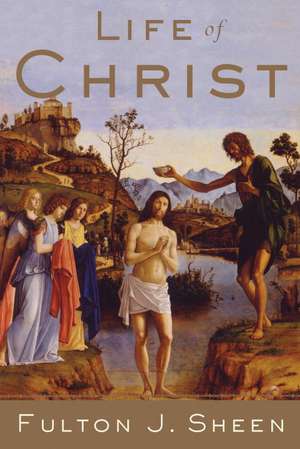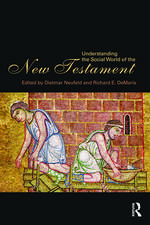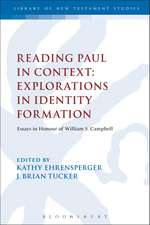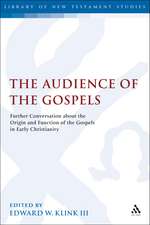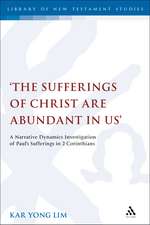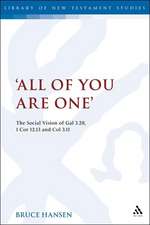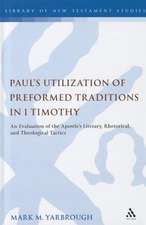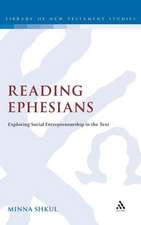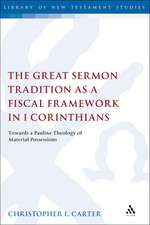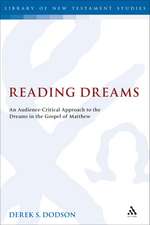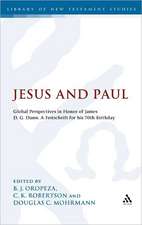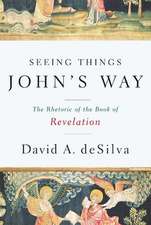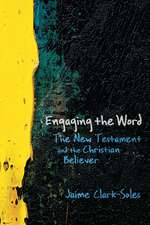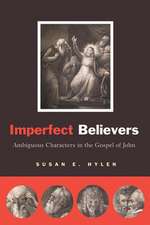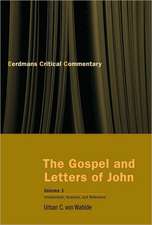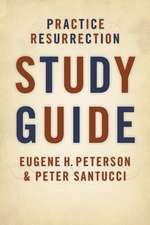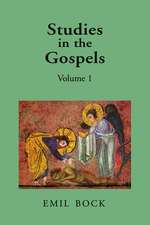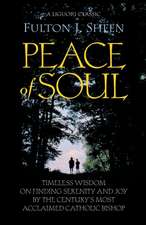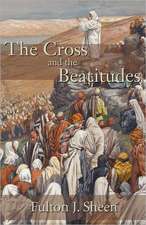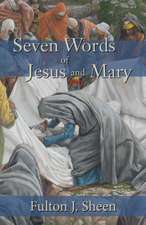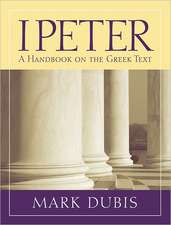Life of Christ
Autor Fulton J. Sheenen Limba Engleză Paperback – 31 iul 1977
With his customary insight and reverence, Sheen interprets the Scripture and describes Christ not only in historical perspective but also in exciting and contemporary terms -- seeing in Christ's life both modern parallels and timeless lessons. His thoughtful, probing analysis provides new insight into well-known Gospel events.
An appealing blend of philosophy, history, and biblical exegesis, from the best-known and most-loved American Catholic leader of the twentieth century, Life of Christ has long been a source of inspiration and guidance. For those seeking to better understand the message of Jesus Christ, this vivid retelling of the greatest story ever lived is a must-read.
Preț: 128.09 lei
Nou
Puncte Express: 192
Preț estimativ în valută:
24.51€ • 26.62$ • 20.59£
24.51€ • 26.62$ • 20.59£
Carte disponibilă
Livrare economică 02-16 aprilie
Preluare comenzi: 021 569.72.76
Specificații
ISBN-13: 9780385132206
ISBN-10: 0385132204
Pagini: 688
Dimensiuni: 135 x 203 x 38 mm
Greutate: 0.52 kg
Ediția:Prescurtată
Editura: IMAGE
ISBN-10: 0385132204
Pagini: 688
Dimensiuni: 135 x 203 x 38 mm
Greutate: 0.52 kg
Ediția:Prescurtată
Editura: IMAGE
Notă biografică
FULTON J. SHEEN (1895 – 1979) was one of the most prominent Catholic leaders in American history. He was bishop of Rochester, national director of the Society for the Propagation of the Faith, and television’s first religious broadcaster, hosting “Life is Worth Living” on the ABC network. Sheen’s cause for canonization is currently under consideration.
Extras
One
The Only Person Ever Pre-Announced
History is full of men who have claimed that they came from God, or that they were gods, or that they bore messages from God--Buddha, Mohammed, Confucius, Christ, Lao-tze, and thousands of others, right down to the person who founded a new religion this very day. Each of them has a right to be heard and considered. But as a yardstick external to and outside of whatever is to be measured is needed, so there must be some permanent tests available to all men, all civilizations, and all ages, by which they can decide whether any one of these claimants, or all of them, are justified in their claims. These tests are of two kinds: reason and history. Reason, because everyone has it, even those without faith; history, because everyone lives in it and should know something about it.
Reason dictates that if any one of these men actually came from God, the least thing that God could do to support His claim would be to pre-announce His coming. Automobile manufacturers tell their customers when to expect a new model. If God sent anyone from Himself, or if He came Himself with a vitally important message for all men, it would seem reasonable that He would first let men know when His messenger was coming, where He would be born, where He would live, the doctrine He would teach, the enemies He would make, the program He would adopt for the future, and the manner of His death. By the extent to which the messenger conformed with these announcements, one could judge the validity of his claims.
Reason further assures us that if God did not do this, then there would be nothing to prevent any impostor from appearing in history and saying, "I come from God," or "An angel appeared to me in the desert and gave me this message." In such cases there would be no objective, historical way of testing the messenger. We would have only his word for it, and of course he could be wrong.
If a visitor came from a foreign country to Washington and said he was a diplomat, the government would ask him for his passport and other documents testifying that he represented a certain government. His papers would have to antedate his coming. If such proofs of identity are asked from delegates of other countries, reason certainly ought to do so with messengers who claim to have come from God. To each claimant reason says, "What record was there before you were born that you were coming?"
With this test one can evaluate the claimants. (And at this preliminary stage, Christ is no greater that the others.) Socartes had no one to foretell his birth. Buddha had no one to pre-announce him and his message or tell the day when he would sit under the tree. Confucius did not have the name of his mother and his birthplace recorded, nor were they given to men centuries before he arrived so that when he did come, men would know he was a messanger from God. But, with Christ it was different. Because of the Old Testament prophecies, His coming was not unexpected. There was no predictions about Buddha, coming was not unexpected. There were no predictions about Buddha, Confucius, Lao-tze, Mohammed, or anyone else; but there were predictions about Christ. Others just came and said, "Here I am, believe me." They were, therefore, only men among men and not the Divine in the human. Christ alone stepped out of that line saying, "Search the writings of the Jewish people and the related history of the Babylonians, Persians, Greeks, and Romans." (For the moment, pagan writings and even the Old Testament may be regarded only as historical documents, not as inspired works.)
It is true that the prophecies of the Old Testament can be best understood in the light of their fulfillment. The language of prophecy does not have the exactness of mathematics. Yet if one searches out the various Messianic currents in the Old Testament, and compares the resulting picture with the life and work of Christ, can one doubt that the ancient predictions point to Jesus and the kingdom which he established? God's promise to the patriarchs that through them all the nations of the earth would be blessed; the prediction that the tribe of Juda would be supreme among the other Hebrew tribes until the coming of Him Whom all nations would obey; the strange yet undeniable fact that in the Bible of the Alexandrian Jews, the Septuagint, one finds clearly predicted the virgin birth of the Messias; the prophecy of Isaias 53 about the patient sufferer, the Servant of the Lord, who will lay down his life as a guilt-offering for his people's offenses; the perspectives of the glorious, everlasting kingdom of the House of David--in whom but Christ have these prophecies found their fulfillment? From an historical point of view alone, here is uniqueness which sets Christ apart from all other founders of world religions. And once the fulfillment of these prophecies did historically take place in the person of Christ, not only did all prophecies cease in Israel, but there was discontinuance of sacrifices when the true Paschal Lamb was sacrificed.
Turn to pagan testimony. Tacitus, speaking for the ancient Romans, says, "People were generally persuaded in the faith of the ancient prophecies, that the East was to prevail, and that from Judea was to come the Master and Ruler of the world." Suetonius, in his account of the life of Vespasian, recounts the Roman tradition thus, "It was an old and constant belief throughout the East, that by indubitably certain prophecies, the Jews were to attain the highest power."
China had the same expectation; but because it was on the other side of the world, it believed that the great Wise Man would be born in the West. The Annals of the Celestial Empire contain the statement:
In the 24th year of Tchao-Wang of the dynasty of the Tcheou, on the 8th day of the 4th moon, a light appeared in the Southwest which illumined the king's palace. The monarch, struck by its splendor, interrogated the sages. They showed him books in which this prodigy signified the appearance of the great Saint of the West whose religion was to be introduced into their country.
The Greeks expected Him, for Aeschylus in his Prometheus six centuries before His coming, wrote, "Look not for any end, moreover, to this curse until God appears, to accept upon His Head the pangs of thy own sins vicarious."
How did the Magi of the East know of His coming? Probably from the many prophecies circulated through the world by the Jews as well as through the prophecy made to the Gentiles by Daniel centuries before His birth.
Cicero, after recounting the sayings of the ancient oracles and the Sibyls about a "King whom we must recognize to be saved," asked in expectation, "To what man and to what period of time do these predictions point?" The Fourth Eclogue of Virgil recounted the same ancient tradition and spoke of "a chaste woman, smiling on her infant boy, with whom the iron age would pass away."
Suetonius quoted a contemporary author to the effect that the Romans were so fearful about a king who would rule the world that they ordered all children born that year to be killed--an order that was not fulfilled, except by Herod.
Not only were the Jews expecting the birth of a Great King, a Wise Man and a Savior, but Plato and Socrates also spoke of the Logos and of the Universal Wise Man "yet to come." Confucius spoke of "the Saint"; the Sibyls, of a "Universal King"; the Greek dramatist, of a savior and redeemer to unloose man from the "primal eldest curse." All these were on the Gentile side of the expectation. What separates Christ from all men is that first He was expected; even the Gentiles had a longing for a deliverer, or redeemer. This fact alone distinguishes Him from all other religious leaders.
A second distinguishing fact is that once He appeared, He struck history with such impact that He split it in two, dividing it into two periods: one before His coming, the other after it. Buddha did not do this, nor any of the great Indian philosophers. Even those who deny God must date their attacks upon Him, a.d. so and so, or so many years after His coming.
A third fact separating Him from all the others is this: every other person who ever came into this world came into it to live. He came into it to die. Death was a stumbling block to Socrates--it interrupted his teaching. But to Christ, death was the goal and fulfillment of His life, the gold that He was seeking. Few of His words or actions are intelligible without reference to His Cross. He presented Himself as a Savior rather than merely as a Teacher. It meant nothing to teach men to be good unless He also gave them the power to be good, after rescuing them from the frustration of guilt.
The story of every human life begins with birth and ends with death. In the Person of Christ, however, it was His death that was first and His life that was last. The scripture describes Him as "the Lamb slain as it were, from the beginning of the world." He was slain in intention by the first sin and rebellion against God. It was not so much that His birth cast a shadow on His life and thus led to His death; it was rather that the Cross was first, and cast its shadow back to His birth. His has been the only life in the world that was ever lived backward. As the flower in the crannied wall tells the poet of nature, and as the atom is the miniature of the solar system, so too, His birth tells the mystery of the gibbet. He went from the known to the known, from the reason of His coming manifested by His name "Jesus" or "Savior" to the fulfillment of His coming, namely, His death on the Cross.
John gives us His eternal prehistory; Matthew, His temporal prehistory, by way of His genealogy. It is significant how much His temporal ancestry was connected with sinners and foreigners! These blots on the escutcheon of His human lineage suggest a pity for the sinful and for the strangers to the Covenant. Both these aspects of His compassion would later on be hurled against Him as accusations: "He is a friend of sinners"; "He is a Samaritan." But the shadow of a stained past foretells His future love for the stained. Born of a woman, He was a man and could be one with all humanity; born of a Virgin, who was overshadowed by the Spirit and "full of grace," He would also be outside that current of sin which infected all men.
Two
Early Life of Christ
A fourth distinguishing fact is that He does not fit, as the other world teachers do, into the established category of a good man. Good men do not lie. But if Christ was not all that He said He was, namely, the Son of the living God, the Word of God in the flesh, then
He was not "just a good man"; then He was a knave, a liar, a charlatan and the greatest deceiver who ever lived. If He was not what He said He was, the Christ, the Son of God, He was the anti-Christ! If He was only a man, then He was not even a "good" man.
But He was not only a man. He would have us either worship Him or despise Him--despise Him as a mere man, or worship Him as true God and true man. That is the alternative He presents. It may very well be that the Communists, who are so anti-Christ, are closer to Him than those who see Him as a sentimentalist and a vague moral reformer. The Communists have at least decided that if He wins, they lose; the others are afraid to consider Him either as winning or losing, because they are not prepared to meet the moral demands which this victory would make on their souls.
If He is what He claimed to be, a Savior, a Redeemer, then we have a virile Christ and a leader worth following in these terrible times; One Who will step into the breach of death, crushing sin, gloom and despair; a leader to Whom we can make totalitarian sacrifice without losing, but gaining freedom, and Whom we can love even unto death. We need a Christ today Who will make cords and drive the buyers and sellers from our new temples; Who will blast the unfruitful fig-trees; Who will talk of crosses and sacrifices and Whose voice will be like the voice of the raging sea. But He will not allow us to pick and choose among His words, discarding the hard ones, and accepting the ones that please our fancy. We need a Christ Who will restore moral indignation, Who will make us hate evil with a passionate intensity, and love goodness to a point where we can drink death like water.
The Annunciation
Every civilization has had a tradition of a golden age in the past. A more precise Jewish record tells of a fall from a state of innocence and happiness through a woman tempting a man. If a woman played such a role in the fall of mankind, should she not play a great role in its restoration? And if there was a lost Paradise in which the first nuptials of man and woman were celebrated, might there not be a new Paradise in which the nuptials of God and man would be celebrated?
In the fullness of time an Angel of Light came down from the great Throne of Light to a Virgin kneeling in prayer, to ask her if she was willing to give God a human nature. Her answer was that she "knew not man" and, therefore, could not be the mother of the "Expected of the Nations."
There never can be a birth without love. In this the maiden was right. The begetting of new life requires the fires of love. But besides the human passion which begets life, there is the "passionless passion and wild tranquility" of the Holy Spirit; and it was this that overshadowed the woman and begot in her Emmanuel or "God with us." At the moment that Mary pronounced Fiat or "Be it done," something greater happened than the Fiat lux (Let there be light) of creation; for the light that was now made was not the sun, but the Son of God in the flesh. By pronouncing Fiat Mary achieved the full role of womanhood, namely, to be the bearer of God's gifts to man. There is a passive receptiveness in which woman says Fiat to the cosmos as she shares its rhythm, Fiat to a man's love as she receives it, and Fiat to God as she receives the Spirit.
The Only Person Ever Pre-Announced
History is full of men who have claimed that they came from God, or that they were gods, or that they bore messages from God--Buddha, Mohammed, Confucius, Christ, Lao-tze, and thousands of others, right down to the person who founded a new religion this very day. Each of them has a right to be heard and considered. But as a yardstick external to and outside of whatever is to be measured is needed, so there must be some permanent tests available to all men, all civilizations, and all ages, by which they can decide whether any one of these claimants, or all of them, are justified in their claims. These tests are of two kinds: reason and history. Reason, because everyone has it, even those without faith; history, because everyone lives in it and should know something about it.
Reason dictates that if any one of these men actually came from God, the least thing that God could do to support His claim would be to pre-announce His coming. Automobile manufacturers tell their customers when to expect a new model. If God sent anyone from Himself, or if He came Himself with a vitally important message for all men, it would seem reasonable that He would first let men know when His messenger was coming, where He would be born, where He would live, the doctrine He would teach, the enemies He would make, the program He would adopt for the future, and the manner of His death. By the extent to which the messenger conformed with these announcements, one could judge the validity of his claims.
Reason further assures us that if God did not do this, then there would be nothing to prevent any impostor from appearing in history and saying, "I come from God," or "An angel appeared to me in the desert and gave me this message." In such cases there would be no objective, historical way of testing the messenger. We would have only his word for it, and of course he could be wrong.
If a visitor came from a foreign country to Washington and said he was a diplomat, the government would ask him for his passport and other documents testifying that he represented a certain government. His papers would have to antedate his coming. If such proofs of identity are asked from delegates of other countries, reason certainly ought to do so with messengers who claim to have come from God. To each claimant reason says, "What record was there before you were born that you were coming?"
With this test one can evaluate the claimants. (And at this preliminary stage, Christ is no greater that the others.) Socartes had no one to foretell his birth. Buddha had no one to pre-announce him and his message or tell the day when he would sit under the tree. Confucius did not have the name of his mother and his birthplace recorded, nor were they given to men centuries before he arrived so that when he did come, men would know he was a messanger from God. But, with Christ it was different. Because of the Old Testament prophecies, His coming was not unexpected. There was no predictions about Buddha, coming was not unexpected. There were no predictions about Buddha, Confucius, Lao-tze, Mohammed, or anyone else; but there were predictions about Christ. Others just came and said, "Here I am, believe me." They were, therefore, only men among men and not the Divine in the human. Christ alone stepped out of that line saying, "Search the writings of the Jewish people and the related history of the Babylonians, Persians, Greeks, and Romans." (For the moment, pagan writings and even the Old Testament may be regarded only as historical documents, not as inspired works.)
It is true that the prophecies of the Old Testament can be best understood in the light of their fulfillment. The language of prophecy does not have the exactness of mathematics. Yet if one searches out the various Messianic currents in the Old Testament, and compares the resulting picture with the life and work of Christ, can one doubt that the ancient predictions point to Jesus and the kingdom which he established? God's promise to the patriarchs that through them all the nations of the earth would be blessed; the prediction that the tribe of Juda would be supreme among the other Hebrew tribes until the coming of Him Whom all nations would obey; the strange yet undeniable fact that in the Bible of the Alexandrian Jews, the Septuagint, one finds clearly predicted the virgin birth of the Messias; the prophecy of Isaias 53 about the patient sufferer, the Servant of the Lord, who will lay down his life as a guilt-offering for his people's offenses; the perspectives of the glorious, everlasting kingdom of the House of David--in whom but Christ have these prophecies found their fulfillment? From an historical point of view alone, here is uniqueness which sets Christ apart from all other founders of world religions. And once the fulfillment of these prophecies did historically take place in the person of Christ, not only did all prophecies cease in Israel, but there was discontinuance of sacrifices when the true Paschal Lamb was sacrificed.
Turn to pagan testimony. Tacitus, speaking for the ancient Romans, says, "People were generally persuaded in the faith of the ancient prophecies, that the East was to prevail, and that from Judea was to come the Master and Ruler of the world." Suetonius, in his account of the life of Vespasian, recounts the Roman tradition thus, "It was an old and constant belief throughout the East, that by indubitably certain prophecies, the Jews were to attain the highest power."
China had the same expectation; but because it was on the other side of the world, it believed that the great Wise Man would be born in the West. The Annals of the Celestial Empire contain the statement:
In the 24th year of Tchao-Wang of the dynasty of the Tcheou, on the 8th day of the 4th moon, a light appeared in the Southwest which illumined the king's palace. The monarch, struck by its splendor, interrogated the sages. They showed him books in which this prodigy signified the appearance of the great Saint of the West whose religion was to be introduced into their country.
The Greeks expected Him, for Aeschylus in his Prometheus six centuries before His coming, wrote, "Look not for any end, moreover, to this curse until God appears, to accept upon His Head the pangs of thy own sins vicarious."
How did the Magi of the East know of His coming? Probably from the many prophecies circulated through the world by the Jews as well as through the prophecy made to the Gentiles by Daniel centuries before His birth.
Cicero, after recounting the sayings of the ancient oracles and the Sibyls about a "King whom we must recognize to be saved," asked in expectation, "To what man and to what period of time do these predictions point?" The Fourth Eclogue of Virgil recounted the same ancient tradition and spoke of "a chaste woman, smiling on her infant boy, with whom the iron age would pass away."
Suetonius quoted a contemporary author to the effect that the Romans were so fearful about a king who would rule the world that they ordered all children born that year to be killed--an order that was not fulfilled, except by Herod.
Not only were the Jews expecting the birth of a Great King, a Wise Man and a Savior, but Plato and Socrates also spoke of the Logos and of the Universal Wise Man "yet to come." Confucius spoke of "the Saint"; the Sibyls, of a "Universal King"; the Greek dramatist, of a savior and redeemer to unloose man from the "primal eldest curse." All these were on the Gentile side of the expectation. What separates Christ from all men is that first He was expected; even the Gentiles had a longing for a deliverer, or redeemer. This fact alone distinguishes Him from all other religious leaders.
A second distinguishing fact is that once He appeared, He struck history with such impact that He split it in two, dividing it into two periods: one before His coming, the other after it. Buddha did not do this, nor any of the great Indian philosophers. Even those who deny God must date their attacks upon Him, a.d. so and so, or so many years after His coming.
A third fact separating Him from all the others is this: every other person who ever came into this world came into it to live. He came into it to die. Death was a stumbling block to Socrates--it interrupted his teaching. But to Christ, death was the goal and fulfillment of His life, the gold that He was seeking. Few of His words or actions are intelligible without reference to His Cross. He presented Himself as a Savior rather than merely as a Teacher. It meant nothing to teach men to be good unless He also gave them the power to be good, after rescuing them from the frustration of guilt.
The story of every human life begins with birth and ends with death. In the Person of Christ, however, it was His death that was first and His life that was last. The scripture describes Him as "the Lamb slain as it were, from the beginning of the world." He was slain in intention by the first sin and rebellion against God. It was not so much that His birth cast a shadow on His life and thus led to His death; it was rather that the Cross was first, and cast its shadow back to His birth. His has been the only life in the world that was ever lived backward. As the flower in the crannied wall tells the poet of nature, and as the atom is the miniature of the solar system, so too, His birth tells the mystery of the gibbet. He went from the known to the known, from the reason of His coming manifested by His name "Jesus" or "Savior" to the fulfillment of His coming, namely, His death on the Cross.
John gives us His eternal prehistory; Matthew, His temporal prehistory, by way of His genealogy. It is significant how much His temporal ancestry was connected with sinners and foreigners! These blots on the escutcheon of His human lineage suggest a pity for the sinful and for the strangers to the Covenant. Both these aspects of His compassion would later on be hurled against Him as accusations: "He is a friend of sinners"; "He is a Samaritan." But the shadow of a stained past foretells His future love for the stained. Born of a woman, He was a man and could be one with all humanity; born of a Virgin, who was overshadowed by the Spirit and "full of grace," He would also be outside that current of sin which infected all men.
Two
Early Life of Christ
A fourth distinguishing fact is that He does not fit, as the other world teachers do, into the established category of a good man. Good men do not lie. But if Christ was not all that He said He was, namely, the Son of the living God, the Word of God in the flesh, then
He was not "just a good man"; then He was a knave, a liar, a charlatan and the greatest deceiver who ever lived. If He was not what He said He was, the Christ, the Son of God, He was the anti-Christ! If He was only a man, then He was not even a "good" man.
But He was not only a man. He would have us either worship Him or despise Him--despise Him as a mere man, or worship Him as true God and true man. That is the alternative He presents. It may very well be that the Communists, who are so anti-Christ, are closer to Him than those who see Him as a sentimentalist and a vague moral reformer. The Communists have at least decided that if He wins, they lose; the others are afraid to consider Him either as winning or losing, because they are not prepared to meet the moral demands which this victory would make on their souls.
If He is what He claimed to be, a Savior, a Redeemer, then we have a virile Christ and a leader worth following in these terrible times; One Who will step into the breach of death, crushing sin, gloom and despair; a leader to Whom we can make totalitarian sacrifice without losing, but gaining freedom, and Whom we can love even unto death. We need a Christ today Who will make cords and drive the buyers and sellers from our new temples; Who will blast the unfruitful fig-trees; Who will talk of crosses and sacrifices and Whose voice will be like the voice of the raging sea. But He will not allow us to pick and choose among His words, discarding the hard ones, and accepting the ones that please our fancy. We need a Christ Who will restore moral indignation, Who will make us hate evil with a passionate intensity, and love goodness to a point where we can drink death like water.
The Annunciation
Every civilization has had a tradition of a golden age in the past. A more precise Jewish record tells of a fall from a state of innocence and happiness through a woman tempting a man. If a woman played such a role in the fall of mankind, should she not play a great role in its restoration? And if there was a lost Paradise in which the first nuptials of man and woman were celebrated, might there not be a new Paradise in which the nuptials of God and man would be celebrated?
In the fullness of time an Angel of Light came down from the great Throne of Light to a Virgin kneeling in prayer, to ask her if she was willing to give God a human nature. Her answer was that she "knew not man" and, therefore, could not be the mother of the "Expected of the Nations."
There never can be a birth without love. In this the maiden was right. The begetting of new life requires the fires of love. But besides the human passion which begets life, there is the "passionless passion and wild tranquility" of the Holy Spirit; and it was this that overshadowed the woman and begot in her Emmanuel or "God with us." At the moment that Mary pronounced Fiat or "Be it done," something greater happened than the Fiat lux (Let there be light) of creation; for the light that was now made was not the sun, but the Son of God in the flesh. By pronouncing Fiat Mary achieved the full role of womanhood, namely, to be the bearer of God's gifts to man. There is a passive receptiveness in which woman says Fiat to the cosmos as she shares its rhythm, Fiat to a man's love as she receives it, and Fiat to God as she receives the Spirit.
